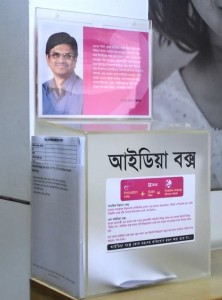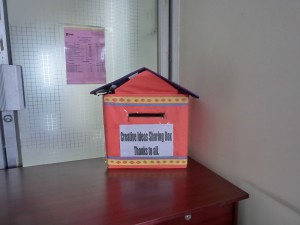“In 1973, in the earliest days of BRAC, when Sir Abed used to go to field in Sullah and Dherai, the journey was long and transport wasn’t as good as it is today. He would spend his days travelling and talking with clients. In the evenings he would sit with field workers and they would share their ideas with him. Sir Abed would come back to Dhaka with all those ideas in his head,–back then the idea box was in his head.”- Shukhendra Kumar Sarkar, Director of BRAC’s Programme Support Unit
BRAC has always been innovative. innovation is a core value that has helped BRAC become the largest development organization in the world. However, as BRAC grew it had to decentralize and the programs had to have different management systems to effectively reach all of BRAC’s many clients. With too many managers and layers of complexity the flow of information from field to the HO and senior management became difficult. While this has not stopped innovation it has created filters and limited scope for innovation.
For BRAC, innovation means responding to clients’ needs. Idea generation has to be catalyzed through engagement with field staff who work closely with the community, and connect them with the right person.
The Social Innovation Lab was created to institutionalize innovation. As we are a small unit with limited infrastructure we devised an innovative way of collecting and promoting ideas, through a box! Similar to a suggestion box, these boxes are being piloted in 3 of BRAC’s Learning Centres in Mymensingh, Jessore and Comilla districts.

On the 22nd of September the Social Innovation Lab presented 15 ideas from field to the Inter Program Coordination Meeting (IPC), which is a weekly coordination meeting that takes place at the head office. It is attended by all program heads and is chaired by the Chief Financial Officer; S.N. Kairy and Senior Director, Asif Saleh . The ideas were well received, and the senior management were quite impressed. Some ideas were discussed at length such as:
- Teacher’s Loan: Md Abu Saleh Ahmed working for the Process Review Unit of Nilphamari suggested that BRAC could provide custom designed loans for teachers. He shared that teachers are a discriminated group of people. As there are no loan schemes specifically catered to their needs they are taking loans from informal businessmen who charge as high as 80% interest and keep their salary cheques as collateral. This group finds regular bank loan services to be too expensive and time-consuming, especially as the ceiling range is usually low. He suggested that BRAC start a loan scheme of 56,000 taka which the teachers can pay back in 2800 tk installments per month at 50% interest rate over a period of 24 months.Reaz Uddin Program Head of MF and Khairy Da both shared that they have heard similar ideas before, with the intention being expanding the number of clients, but a teacher loan scheme has to be one that falls into either the Dabi or Progoti schemes. BRAC cannot charge 50% interest. Furthermore, in rural areas teachers have very strong associations and taking administrative actions in case of defaults will be hard to take. However, the Program Head of Microfinance felt it was a good idea and it may be able to be implemented in the future if it can be adjusted to the existing scheme.
- Health Insurance for ‘good customer’ loanee: Arafin Gulshan Ara from Mymensingh BLC suggested that BRAC provide health insurance to good loanees to enhance coordination and promotion of both the Health and MF programmes along with motivating loanees.While health insurance is not being provided MF has begun to provide health checkups to VO members before loan disbursement, this initiative is a collaborative effort by both MF and Health.
- Film/Video club: Monowarul Islam from Faridpur shared an idea about promoting BRAC. Most field staff is unaware of the many awards and acknowledgements that we have received as they have limited or no access to the internet. As a result, many do not know the scope of BRAC’s work and our global influence. Monowarul feels that because many field staff are unaware of these awards, they are unable to take pride in BRAC’s accomplishments.Sadequr Rahman of the BRAC Learning Division mentioned that there is going to be an orientation session each week where participants will watch videos about overall norms and protocols of the BLCs and BRAC and would love to include videos about BRAC and its achievements. This way every staff residing in the BLCs and undergoing training would be well-informed about BRAC’s achievements.
In summary, the ideas mostly reflected concerns about staff’s well-being and depicted a communication gap between senior management and field staff. This further accentuated a need for a medium for ideas to be received, documented shared and implemented. The CFO has said it is important that the ideas from the field are discussed with senior managers as it not only sparks innovation but also provides important information that can help inform strategic decisions. It also begins conversations, or offers new ways to understand situations, which can help lead to new solutions.
The Social Innovation Lab was also inspired when Chittagong BLC faculty members were inspired to build their own idea box after reading about our Idea Box on Shetu! SIL will be launching its next idea box in Chittagong, and scale up to all 22 BLCs. Anyone is welcome to send us an idea by post or by email.

Check out the Idea Box presentation to the IPC: http://www.slideshare.net/BRACSocialInnovationLab/ideas-from-field-shamsin-ahmeds-conflicted-copy-2013-0922